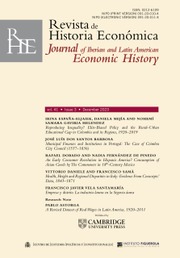Article contents
BOLIVIAN PUBLIC FINANCES, 1882-2010. THE CHALLENGE TO MAKE SOCIAL SPENDING SUSTAINABLE*
Published online by Cambridge University Press: 27 March 2014
Abstract
This paper offers a long-term comparative study of Bolivian public finances using a new detailed database. First, it shows that Bolivian government revenues and expenditures were particularly small and volatile until the 1980s. Second, it stresses that, whereas the relative importance of social expenditure has grown constantly since the late 1930s, public revenues have always had an unbalanced structure. Finally, it confirms that budget deficits have been constant, at times reaching levels that were especially damaging for the overall economy. This suggests that the potential redistributive impact of Bolivian public finances was not necessarily (or not only) hindered by the lack of an explicit commitment towards redistributive expenses, but by an extreme vulnerability in the revenue side.
Resumen
Este trabajo ofrece un estudio comparativo y de largo plazo de la hacienda pública boliviana mediante una base de datos desagregada. En primer lugar, muestra que los ingresos y gastos públicos fueron bajos y volátiles hasta los 1980s. En segundo lugar, demuestra que mientras la importancia relativa del gasto social se incrementó desde finales de los 1930s, los ingresos públicos mantuvieron una estructura desequilibrada. Finalmente, confirma que los déficits presupuestarios fueron constantes, llegando a alcanzar algunas veces niveles perjudiciales para el resto de la economía. Ello sugiere que el impacto redistribuidor de la hacienda pública boliviana no estuvo necesariamente (o no solo) restringido por la falta de apoyo explícito a gastos redistributivos, sino por una vulnerabilidad considerable en los ingresos.
Keywords
- Type
- Articles/Artículos
- Information
- Revista de Historia Economica - Journal of Iberian and Latin American Economic History , Volume 32 , Issue 1 , March 2014 , pp. 77 - 117
- Copyright
- Copyright © Instituto Figuerola de Historia y Ciencias Sociales, Universidad Carlos III de Madrid 2014
Footnotes
This research has benefited from financial support from the University of Barcelona through the APIF (2008-2012) fellowship program; from the Science and Innovation Ministry of Spain through project ECO2009-13331-C02-02; from the Catalonian Research and Universities Grant Agency through the BE-DGR 2011 fellowship program. The author specially thanks Alfonso Herranz Loncán for his constant support and critical readings of previous drafts. The author also thanks Paola Azar, Luis Bértola, Sebastián Fleitas, Ewout Frankema, Herbert Klein, Fernanda Wanderley and three anonymous referees for their valuable comments on previous drafts. The usual disclaimer applies.
References
REFERENCES
- 15
- Cited by


